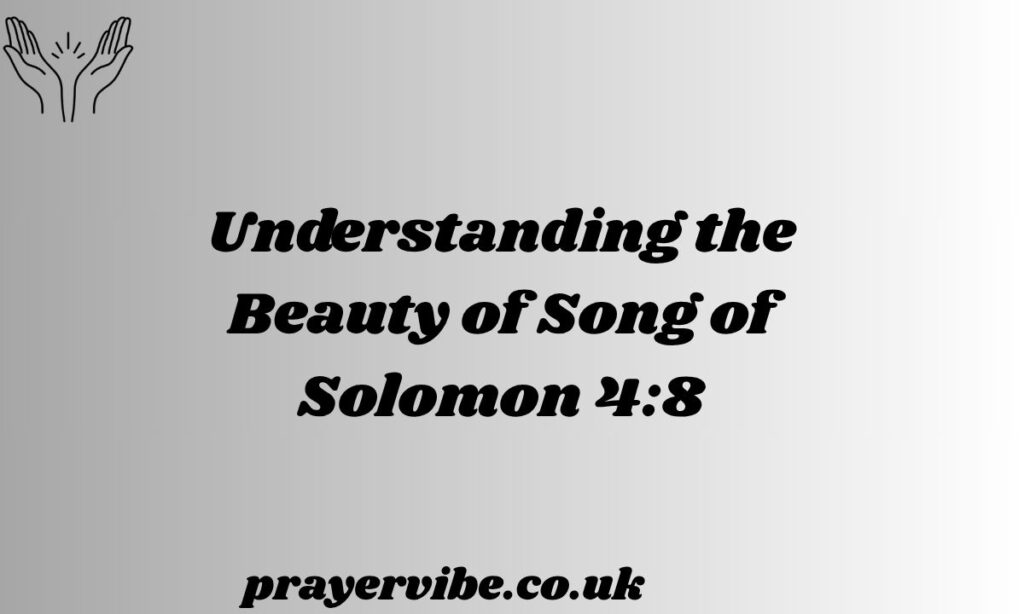Song of Solomon 4:8 is a loving invitation from the groom to his bride. He asks her to leave distant and dangerous places to be with him. The verse uses mountain names and wild animals to show risk and separation.
It’s not just about romance—it’s about closeness and trust. This verse also reflects how God lovingly calls us into a deeper relationship with Him. It reminds us that true love offers safety, unity, and peace.
🙏 Divine Prayer Generator
Select a prayer category to begin
The Context of Song of Solomon 4:8

Song of Solomon 4:8 is a loving call from the groom to his bride. He invites her to leave high mountains and dangerous places. These places represent distance and fear. The groom wants closeness and safety. It shows a desire for love, trust, and deeper connection.
The Song of Songs – A Unique Biblical Love Poem
The Song of Solomon (also called Song of Songs) is a poetic book within the Old Testament. It contains a series of love poems between a bride (the Shulammite woman) and her bridegroom (often understood to be Solomon). The book celebrates love, beauty, and desire in a way that’s both human and symbolic.
Interpretations vary:
- Literally, it’s a celebration of romantic and marital love.
- Allegorically, it represents the love between God and His people or Christ and the Church.
Chapter 4 focuses on the groom’s lavish praise of his bride’s beauty. He uses vivid metaphors to describe her features and expresses his desire for union with her. As he invites her closer, verse 8 stands out as a turning point—a plea for her to leave her distant and potentially dangerous place and come into deeper intimacy.
Understanding the Imagery
“Come with me from Lebanon, my bride…”
Lebanon was a mountainous region known for its grandeur, forests, and rugged terrain. In the Song, it symbolizes distance and perhaps a life still untouched by union or intimacy.
“…from the peak of Amana, from the peak of Senir and Hermon…”
These mountain peaks were distant and majestic, often representing places of isolation or separation.
“…from the dens of lions, from the mountains of leopards.”
This part introduces danger. Lions and leopards are symbols of threat or wildness. The invitation is not just romantic—it’s protective. The groom wants the bride to leave these perilous places and come into the safety and love of his presence.
This verse isn’t just a poetic travel request. It is a loving invitation to leave behind fear, danger, and isolation and move toward intimacy, love, and unity.
Themes in Song of Solomon 4:8
This verse talks about love, trust, and leaving behind fear. It shows how love invites us into safety and unity. The groom lovingly asks for closeness. It also shows how God calls us to leave our fears and come to Him in love, peace, and relationship.
1. Invitation into Intimacy
The most evident theme in this verse is the invitation to draw near. The bridegroom isn’t commanding or coercing; he is tenderly asking his beloved to come with him.
This mirrors how God invites us into a deeper relationship with Him. He doesn’t force Himself upon us but lovingly calls us to leave behind the things that separate us—our past, our fears, our old identity—and follow Him.
2. Separation and Distance
The mention of places like Lebanon, Amana, Senir, and Hermon points to the emotional and spiritual distance that can exist even in relationships. The bride may be admired and desired, but she is not yet fully with the bridegroom.
This highlights a universal theme: in love, physical presence is not enough; there must be emotional and spiritual closeness too. Spiritually, it symbolizes how we often remain distant from God, content in our high places of independence—until we are called down into communion with Him.
3. Protection and Safety
The bride is being called away from “dens of lions” and “mountains of leopards”—metaphors for danger, wilderness, or even spiritual attack.
In life, we often find ourselves in dangerous emotional, spiritual, or relational places. The groom’s call is a gentle rescue, a beckoning into the safety of love, protection, and peace.
This can be seen as a symbolic image of salvation—leaving the wild and deadly terrain of sin or struggle to find refuge in Christ.
4. Unity and Covenant Love
By calling her “my bride,” the groom is declaring a new phase of their relationship. It’s no longer a flirtation or pursuit—it’s a covenant of love. He wants her not just physically, but completely—with her presence, heart, and trust.
The bridegroom’s invitation reveals a desire for wholeness and mutual surrender. This reflects how God does not merely want part of us—He invites us into full communion with Him.
5. Leaving the Past Behind
This verse is also a metaphor for leaving behind the old life. Just as the bride is asked to leave her home in Lebanon and the mountains, we too are often called by God to move out of familiar but unsafe places—spiritually, emotionally, and relationally.
Applications of Song of Solomon 4:8 Today
How does this poetic verse apply to our modern lives? Whether we interpret it in terms of romantic love or spiritual symbolism, its message still resonates powerfully.
1. Respond to God’s Call
Like the bride in this passage, we are invited into a deeper relationship with God. But this requires a response. We must choose to leave behind our comfort zones, our fears, and even our “mountain peaks” of pride or self-reliance.
Application: When you feel God calling you to deeper faith, don’t ignore it. It may feel risky, but it leads to freedom and life.
2. Let Go of Fear
The imagery of wild animals suggests emotional or spiritual danger. Many people today live in a constant state of anxiety, trauma, or toxic situations. This verse encourages us to step away from harmful environments and come into a space of peace and love.
Application: Evaluate the “lions and leopards” in your life. Are you surrounded by harmful influences, fears, or stressors that God is calling you to leave?
3. Pursue Relational Intimacy
In marriage or committed relationships, this verse is a reminder of the importance of emotional closeness. Admiration and attraction are important, but full unity requires vulnerability, trust, and shared presence.
Application: Ask yourself, “Am I drawing near to my partner or keeping emotional distance?” Use loving words and actions to invite each other into deeper connection.
4. Step Away from Your “Mountain Peaks”
The mountains in the verse symbolize elevation—perhaps pride, isolation, or self-sufficiency. In our culture, we often glorify independence to the point of isolation.
Application: If your success or independence is keeping you isolated from real connection with others or with God, consider stepping down and drawing near. True love and spiritual growth happen at ground level—where humility, vulnerability, and grace meet.
5. Trust in God’s Protection
The groom’s invitation implies that he offers something safer and better than what she currently has. Trusting God’s path often means letting go of our own plans.
Application: If God is calling you into something new—a job, a relationship, a ministry—trust that His plan leads away from danger and toward blessing.
Biblical Cross-References

Several Bible verses connect with this message. Genesis 12:1 shows God calling Abraham to leave home. Matthew 11:28 shows Jesus inviting the weary. Psalm 18:2 speaks of God as a place of safety. All these verses remind us that God lovingly calls us to come near.
1. Genesis 12:1
“Go from your country and your kindred and your father’s house to the land that I will show you.”
Like the bride in Song 4:8, Abraham was called to leave his homeland for something greater. God often calls His people to move out of the familiar to enter into His promises.
2. Matthew 11:28
“Come to me, all who labor and are heavy laden, and I will give you rest.”
Jesus’ words echo the bridegroom’s invitation. It is a call away from burden, danger, and distance, and into the restful presence of divine love.
3. Philippians 3:13–14
“Forgetting what lies behind and straining forward to what lies ahead, I press on toward the goal…”
This passage speaks to the spiritual movement that mirrors the bride’s journey—letting go of the past and moving toward Christ-centered unity.
4. Psalm 18:2
“The Lord is my rock and my fortress and my deliverer…”
In contrast to the dens of lions, God offers safety and refuge. When we step away from danger and draw near to God, we find stability and peace.
5. James 4:8
“Draw near to God, and he will draw near to you.”
This beautifully summarizes the heart of Song 4:8. The bridegroom’s plea—“Come with me”—is the same invitation God gives us today. He longs for closeness with His people.
Frequently Asked Questions
What is the main message of Song of Solomon 4:8?
It’s an invitation to leave fear behind and enter into love, safety, and closeness.
Who is speaking in Song of Solomon 4:8?
The groom is speaking, inviting his bride to come away with him.
What do the mountains and wild animals represent?
They symbolize distance, danger, fear, and emotional separation.
How does this verse relate to God’s love?
It reflects how God lovingly calls us out of fear into a safe and intimate relationship with Him.
Can Song of Solomon 4:8 apply to our personal lives today?
Yes, it teaches us to leave harmful situations and pursue love, trust, and deeper connection.
Conclusion
Song of Solomon 4:8 is more than a romantic verse—it’s a powerful message of love, trust, and invitation. The groom’s call to the bride to leave dangerous, distant places shows how true love creates a space of safety and belonging.
This verse also points us to God’s heart. He calls us to step out of fear, loneliness, or past pain and into a loving relationship with Him. Whether in marriage, friendship, or faith, the message is clear: love draws us near, and we are always invited to come closer.

Daniel Miller is a passionate writer, SEO expert, and blogger, specializing in Bible verses, prayers, and faith-based content at PrayerVibe.







